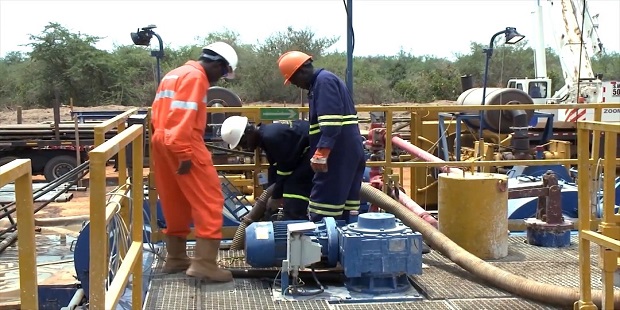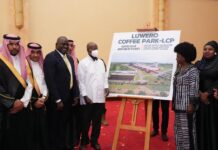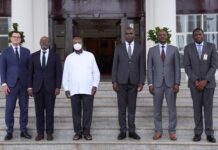By URN
The Africa Development Bank has warned it is “a race with time” for Uganda to begin pumping its oil out of the ground or risk future losses.
Edward Sennoga, Second Lead Economist for the AfDB’s East African office said there is an opportunity for Uganda to earn from its newly found oil but time was running out.
“So we are racing against time for Uganda. We need to harness this fossil fuel for short-term energy security but time is not on our side,” said Edward Snnonga. He was one of the speakers at the launch of the African Development Bank’s Uganda Country Focus Report 2023 at Hotel Africa in Kampala.
The warning by Sennoga and other experts is based on the fear that the global shift or transition to low-carbon economies or the energy transition could affect the demand for oil globally.
Some experts have indicated that Uganda should have begun pumping its oil before 2030 or 2040 when the world shifts to electric vehicles. The Energy transition bringing new pressures to bear on the oil and gas sector from stakeholders and regulators.
In its net zero by 2050 road map, the International Energy Agency (IEA) highlighted that the global energy sector needs to achieve a significant reduction in the use of hydrocarbons by 2040—including the phasing out of all unabated coal and oil power plants—in order to reach net zero by 2050.
Uganda is currently constructing infrastructure valued at $10 billion for the Tilenga projects by TotalEnergies and the King Fisher project owned by CNOOC.
The construction of additional infrastructure like the crude oil refinery valued at about $4 Billion and the East African Crude oil pipeline (EACOP) valued at $3.5 billion is yet to take off.
Sennoga warned that there is a challenge of potentially stranded assets if the country does not move forward with its oil and gas activities to production.
“So we need to bring all that into focus. The good thing is that Uganda has been investing for quite some time in building institutions that can help that advancement” said Sennonga “So again that is important for us to keep on the radar. We don’t have all the time. There is going to be a time when demand for oil is going to be dipping,” he added.
So according to Sennonga, this is Uganda’s time to take advantage of oil and gas resources but also invest in productivity in other sectors to expand productivity in other sectors.
In January 2022, a nonprofit financial think tank, the Carbon Tracker Initiative tracking how the assets in the oil and gas sector were likely to be impacted by the energy transition estimated that up to one trillion dollars in assets could be stranded globally.
Why the Delays?
Uganda had its oil out of the ground nearly 18 years after commercial recoverable of was discovered in the Albertine region. The county has also been shifting its projected production timeline from 2020 to the second or third quarter of 2025.
Part of the delay was the failure of the government to conclude major agreements with the oil and gas companies. That delayed the taking of the Final Investment Decision (FID).
There had been a disagreement over disparity in the crude oil pipeline tariffs during the negotiation of the host government agreement (HGA) between Uganda and joint venture partners Total E&P, Tullow oil Uganda and China National Offshore Oil Company, and the Tanzanian government.
The FID was finally taken in February 2022 paving to major construction works at Tilenga and King Fisher projects in Bulisa, Nwoya, and Kikuube districts. Drilling or spudding works are ongoing at the two projects.
The developments suffered another setback at the end of June when an agreement with the American-led venture that was to build and operate the 60,000-barrel crude oil refinery expired.
The government had yet to find a replacement for the Albertine Graben Energy Consortium (AGEC) by the time of filing this report.
Amidst the long waits and delays, the prospects for the global oil industry have keen on changing leading to questions about the economic viability of oil and gas projects in Uganda.




